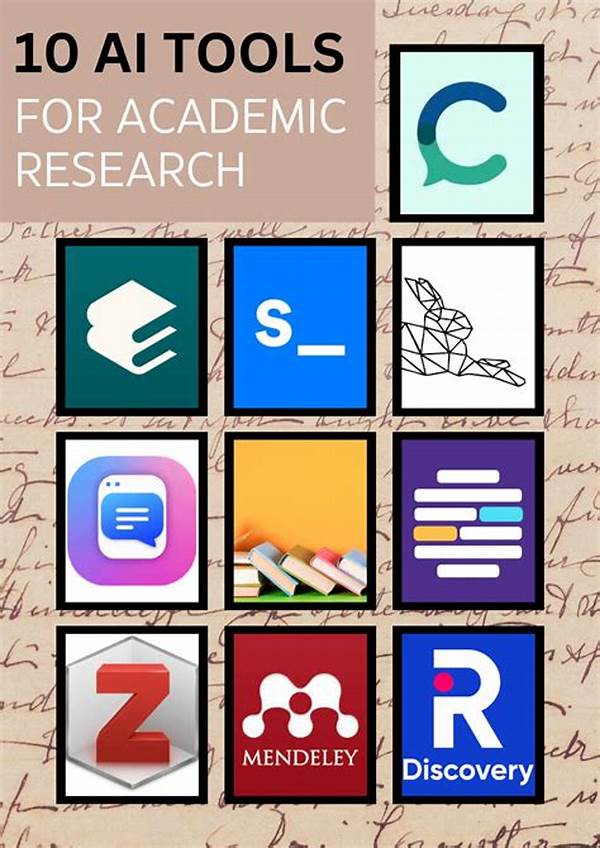In the ever-evolving world of academic research, 2025 is set to be a landmark year. As we continue to push the boundaries of knowledge, the tools we choose to enable our investigations become paramount. Artificial Intelligence (AI) has swiftly emerged as the beacon of progress, promising to unlock new potentials in academic endeavors. Imagine a landscape where intricate data analysis, nuanced pattern recognition, and vast literature reviews can be conducted at lightning speed. Welcome to 2025’s academic world, driven by the power of AI.
Read More : Why Ai Is Reshaping Higher Education In 2025
Consider the challenges researchers face daily: mountains of data with mere hours to deduce meaningful insights. Traditional methods, while reliable, are no match for the demands of modern scholarship. Enter the realm of top AI tools for academic research in 2025. These digital marvels redefine efficiency, enabling researchers to focus on innovation rather than routine tasks. Stories abound in academia of AI-driven projects cutting research time in half, empowering scholars to deliver groundbreaking papers in record time. The excitement is palpable; the potential, limitless.
Gone are the days when AI was considered a luxury for a select few. Today’s students, educators, and seasoned researchers are discovering the extraordinary capabilities of these tools, making their work not only more efficient but remarkably effective. While AI is not a magic wand, it certainly grants a superpower: the luxury of time and precision. As we navigate the academic landscape of 2025, AI emerges as both a guide and a partner, promising a journey of exceptional discovery.
Exploring the Game-Changing Tools
The top AI tools for academic research in 2025 offer a range of functionalities tailored to diverse academic needs. Whether it’s parsing through vast datasets, generating immersive simulations, or conducting intricate qualitative analyses, there’s an AI tool for every phase of research. With AI, researchers can visualize complex data through sophisticated algorithms that identify trends previously invisible to the human eye. These tools not only augment the research process but also foster a deeper understanding of the studied phenomena, unlocking insights that drive academic discourse forward.
—
Article Structure with Headings
When diving into the top AI tools for academic research in 2025, one must appreciate the structured approach to understanding their utility. Here’s how we can dissect this narrative in a five-paragraph form:
1. Introduction to AI in Academic Research
The quest for knowledge has always pushed technological boundaries. AI offers unprecedented capabilities, revolutionizing research methodologies by allowing for faster, more efficient data processing—transforming challenges into triumphs.
2. The Role of AI Tools
AI tools streamline the lengthy procedure of data analysis. With machine learning algorithms, these tools can predict outcomes, recognize trends, and suggest new research directions, significantly accelerating the research process.
3. Innovation in Data Handling
Handling big data has always been cumbersome. New AI solutions offer extraordinary data processing capabilities, ensuring that vast datasets are not just manageable but become a goldmine of insightful information.
4. AI and Interdisciplinary Research
As disciplines increasingly overlap, AI stands as a bridge, facilitating collaboration by breaking down complex interdisciplinary barriers and fostering groundbreaking discoveries.
5. The Impact on Academic Publication
Publishing in academia is undergoing a transformation. AI tools now aid in refining manuscripts, ensuring originality, and even predicting the impact of research findings, thus redefining the scholarly communication landscape.
The Future of Academic Discovery
The intersection of AI and academic research holds promises of an enriched future. Researchers are urged to embrace these top AI tools for academic research in 2025, seizing the opportunity to enhance productivity and innovation.
—
Engaging Discussions on AI Tools
Exploring what makes these AI tools indispensable:
The Road Ahead: Academic Research in 2025
Innovations in AI are not mere accessories in the realm of research; they are fundamental. As we look forward to 2025, academic landscapes are set to transform, driven by these cutting-edge tools. Researchers and institutions alike are encouraged to integrate AI tools, embracing a future that promises more profound insights and discoveries. With AI, the possibilities are as expansive as the field of study itself.
The exploration of these top AI tools for academic research isn’t only about adaptation but thriving in a new era of scholarly inquiry. As we break new ground, AI has become not just a tool but a partner in our academic journey, promising a world where possibilities are as limitless as the curiosity that drives them.


